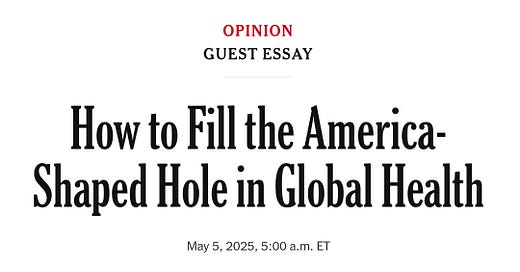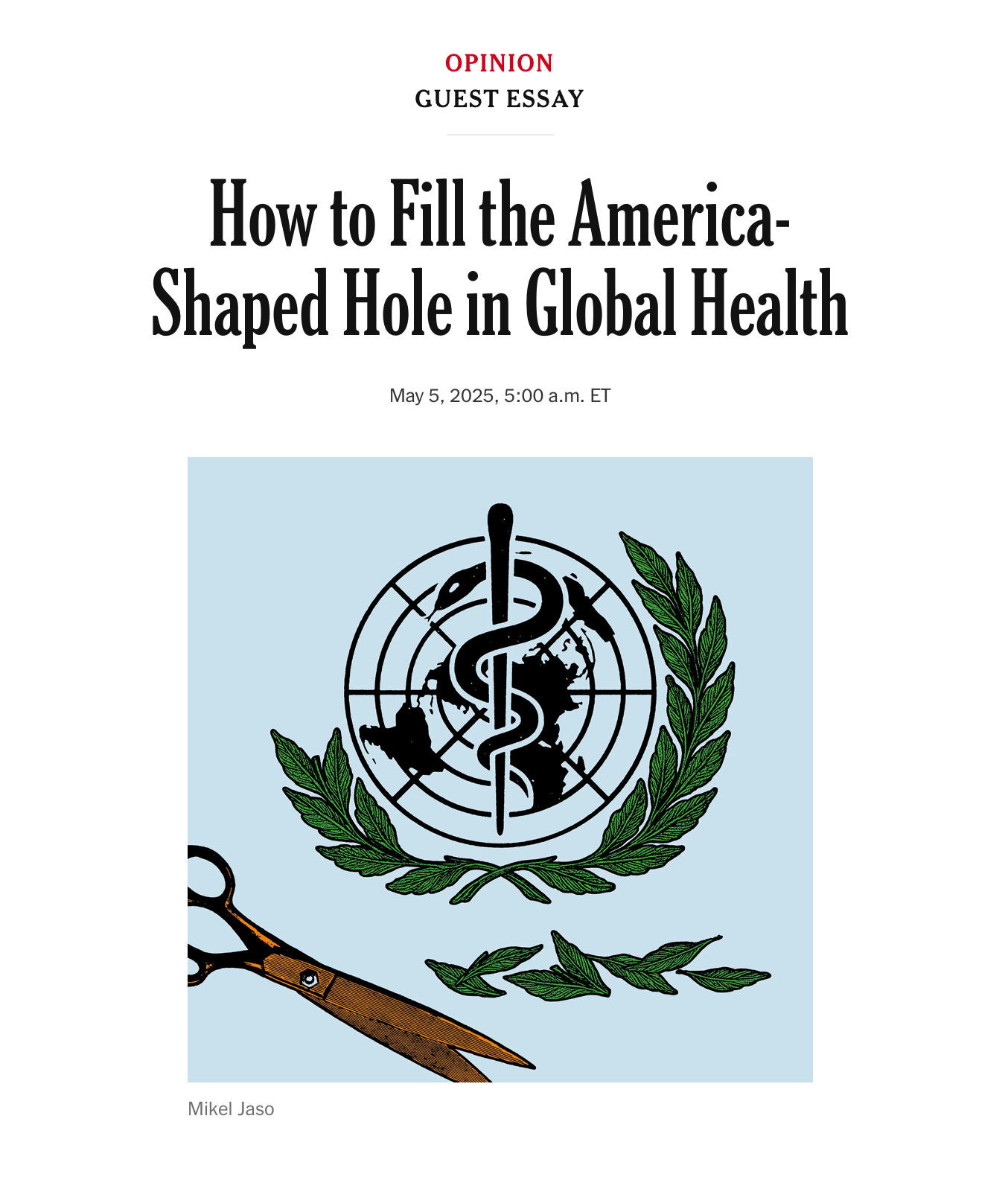In my New York Times guest essay published today, I argue:
Global health and development are too dependent on Western charity. The status quo was always going to unravel eventually.
Since President Trump’s second inauguration, his administration has moved quickly to withdraw the United States from the World Health Organization (WHO) and dismantle the U.S. Agency for International Development (USAID). The consequences are dire.
What the WHO Should Do Now
I believe the WHO should still try to strike a deal with President Trump. Even though the current global health system is flawed, the stakes are too high to allow the US to walk away. The WHO should address Mr. Trump’s concerns head-on — including over the Covid-19 response, the perceived disproportionate U.S. financial burden, and the need for deeper institutional reform.
Specifically, the WHO can take steps to reassure critics:
· Pandemic Response: Despite criticism to the contrary, WHO has consistently kept on the table both natural and lab-based origins of Covid-19. It could do more to recognize potential missteps during COVID-19 — like not emphasizing airborne transmission early on. It should also institute new practices like “red-teaming” (borrowed from the U.S. military) to stress-test and improve emergency responses.
· Funding Results: WHO could propose a gradual reduction in American payments, with other nations stepping up to fill some of the gap. It should also make funding more results-driven, ensuring spending has the greatest demonstrable impact.
· Geopolitical Issues: The WHO could address criticism that the agency failed to properly condemn Hamas when it was accused of militarizing health facilities during the war in Gaza. It could create an independent group to review and recommend improvements to current practices around monitoring and reporting on militarization of health facilities. This might draw the interest of the White House while helping to reinforce norms of international law.
While these steps may not fully sway the Trump administration, they are critical for reinforcing the organization’s effectiveness and legitimacy — with or without U.S. participation.
Building a More Self-Reliant Global Health System
Of course it may be impossible to convince Mr. Trump to change his mind. If that’s the case, countries must take greater ownership and accountability of and investment in their own public health outcomes. As Nigeria’s Health Minister Muhammad Ali Pate recently said, “The U.S. government is not responsible, ultimately, for the health and the security of Nigerian people. At the end of the day, the responsibility is ours.”
This means supporting local scientists and entrepreneurs. With respect to products, countries should increasingly manufacture their own drugs, diagnostics, and vaccines. The African Union, for example, has set a goal to produce 60% of its own vaccines by 2040, with efforts already underway in countries like Senegal, Egypt, and South Africa.
It also means expanding homegrown health services, which may be even more important. Innovations such as Tanzania’s M-mama emergency transport system, community-based mental health therapy in Zimbabwe and Uganda, and Hewatele’s low-cost oxygen distribution system in East Africa show that innovative, scalable, and locally led solutions are both possible and vital.
Another critical step is diversifying funding sources, including from the private sector and development banks. Innovative models like the Global Health Investment Fund, which blends public and private investment, have already proven successful. For example, it supported a South Korean company to make cholera vaccine; the company later became the only one making the vaccine when the global emergency stockpile ran dry in 2024.
Conclusion
As I write in the essay:
The golden age of global health as led by the United States is over. The rest of the world must now focus on building a healthier world that is less dependent on U.S. aid — and less susceptible to U.S. influence and disruption. Greater self-reliance is the path to truly sustainable development.
Read my New York Times guest essay here:
https://www.nytimes.com/2025/05/05/opinion/health-who-membership-trump.html?unlocked_article_code=1.E08.ZqQd.hQT68CF7xyux&smid=nytcore-ios-share&referringSource=articleShare





Thanks for this thorough review Peter. I very much agree with and support all your suggestions, including the (too) brief reference to Hamas. However, I unfortunately do not believe that, should WHO decide to follow them, it will have any impact on the US administration decisions to withdraw from WHO or cut funding to USAID… but very much worth stating!
Your comments are very sad but true. The U. S. has more than enough money and resources to fund both our own (now gutted) public health system as well as global public health work. Why shouldn't the U.S. be the biggest source of money and expertise for global health? We have a bigger economy and more billionaires than any other country. The problem is the inability of our corrupt political system to get human rights priorities prioritized, both nationally and globally, over their own greed. There's no secret re: the large financial donations from corporations (including health care and pharmaceutical companies) to individual politicians. You are absolutely correct that the Trump administration will have to be kowtowed to by the WHO in order to find any chance of working together again. I have worked as a public health nurse since 1988 both stateside and internationally. One thing I can say without hesitation is that Trump and his congressional cronies don't know what this work actually accomplishes for the U.S., and they really couldn't care less.